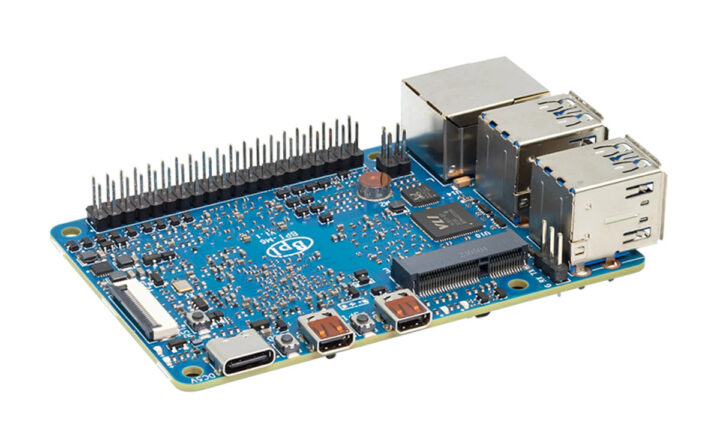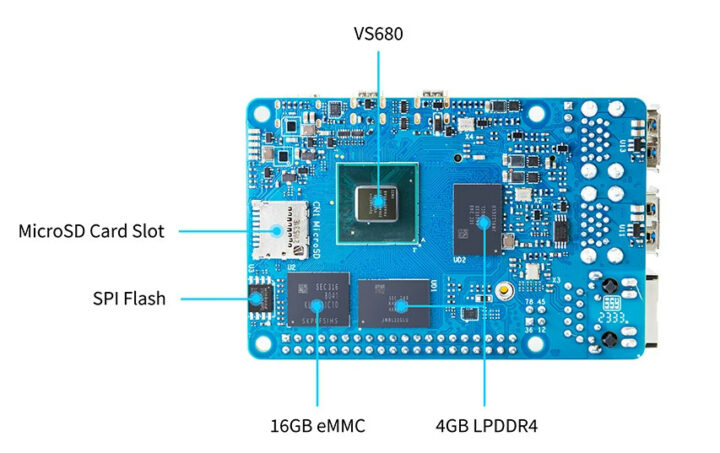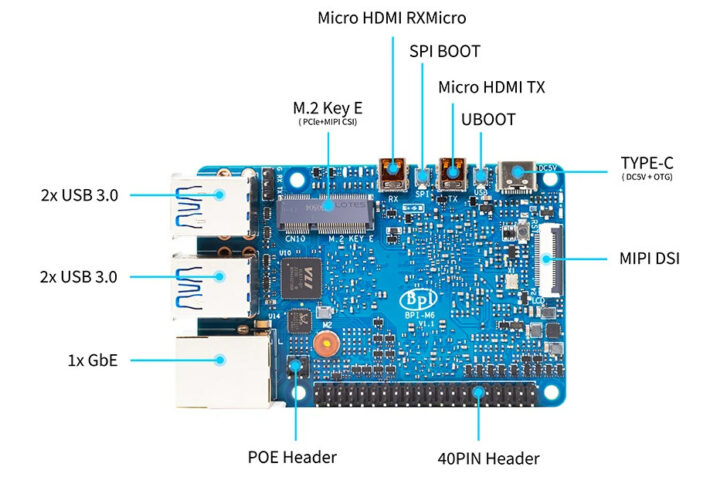Banana Pi BPI-M6 is a credit-card single board computer based on SenaryTech SN3680 SoC comprised of a quad-core Arm Cortex-A73 processor, an Arm Cortex-M3 real-time core, an Imagination GE9920 GPU, and an NPU delivering up to 6.75 TOPS.
The board ships with 4GB LPDDR4 RAM and 16GB eMMC flash. Its layout is fairly similar to the one of the Raspberry Pi 4 with four USB ports, Gigabit Ethernet, a 40-pin GPIO header, a USB Type-C port for power, and two micro HDMI ports. However, only one of those is for HDMI output, as the second is for HDMI input, and there’s also an M.2 Key-E socket for expansion.
Banana Pi BPI-M6 specifications:
- SoC – SenaryTech SN3680 (also known as Synaptics VS680) with
- CPU – Quad-core Arm Cortex-A73 processor up to 2.1GHz
- MCU – Arm Cortex-M3 real-time security core @ 250MHz
- GPU – Imagination PowerVR Series9XE GE9920 GPU
- VPU –
- 4Kp60 H265, H264, VP9, VP8, AV1, MPEG-2 video decoding
- Dual 1080p60 H.264/VP8 video encoding
- NPU – Up to 6.75 TOPS
- Package – FCBGA, 17mm x 17mm
- 12nm manufacturing process
- System Memory – 4 GB LPDDR4
- Storage
- 16GB eMMC flash (option up to 64GB)
- MicroSD card slot
- SPI flash
- Video & Audio I/F
- Micro HDMI 2.1 output up to 4Kp60 with HDR, CEC, EDID
- MIPI DSI interface
- Micro HDMI input
- Networking
- Gigabit Ethernet RJ45 port
- Optional WiFi via USB dongle
- USB – 4x USB 3.0 ports
- Expansion
- M.2 Key E socket (PCIe + MIPI CSI)
- 40-pin header with up to 28x GPIO, UART, I2C, SPI, PWM, and power signals (+5V, +3.3V and GND)
- Misc
- SPI BOOT, UBOOT, and Reset buttons
- Power and Activity LEDs
- Power Supply – 5V/3A via USB Type-C port
- Dimensions – 92 x 60mm
- Weight – 48grams
Banana Pi provides Android and Ubuntu 20.04 images for the board which you’ll find in the wiki along with hardware documentation, a Linux SDK with Kernel 5.4 and Buildroot 2019.10, the config file for the Armbian build system, and instructions to use the SenarySocSystemTool flashing tool.
The VideoSmart VS680 is shown to score 29.90 points in the AI benchmark rankings for IoT processors which shows the NPU is a Vivante VIP9000. It has a higher score than the Amlogic A311D (21.9) and Rockchip RK3566 (14.1), but not quite as good as the better-supported Rockchip RK3588S (95.7) with a (slower in theory) 6 TOPS AI accelerator. For reference, the MediaTek Genio 1200 processor comes in third with 151 points in that list, only outperformed by Qualcomm Snapdragon SA8295P (161) and Mediatek MT8195 (Kompanio 1200) with 165 points.
Banana Pi shared some demo videos showing the AI capabilities of the board, but I was unable to find documentation and resources to make use of the Vivante VIP9000 NPU in the VS680 SoC. Synaptics mentions support for the Synap AI framework, but the company is not exactly known for releasing development tools publicly. Note that the Vivante NPU in the Amlogic A331D SoC recently got Etnaviv open-source driver support, so the VS680 may end up being supported as well, although that will likely depend on the developer community interest rather than Banana Pi working on it…
The Banana Pi BPI-M6 is sold on Aliexpress for $74.74 plus shipping and on Amazon for $84.55 after ticking the box to get a 5% discount.
Updated: This post was initially published on November 22, 2022, when Banana Pi unveiled the board and updated following the availability of the BPI-M6 SBC on Amazon and Aliexpress

Jean-Luc started CNX Software in 2010 as a part-time endeavor, before quitting his job as a software engineering manager, and starting to write daily news, and reviews full time later in 2011.
Support CNX Software! Donate via cryptocurrencies, become a Patron on Patreon, or purchase goods on Amazon or Aliexpress








“will eventually provide Android and Linux images for the board” sound scary :p
From the player in question? It’s not sounding…it IS scary. X-D
That being said, I’ll reserve judgement. If the player making the SoC will work a smidge with the community, it might be “okay” or better. Big IF.
> Banana Pi provides Android and Ubuntu 20.04 images
Something called ‘2024-01-25-ubuntu-20.04-mate-desktop-vpu-npu-bpi-m6-aarch64-sd.img’ suggests them building an 20.04 image in early 2024. Github contents suggest the kernel of this thing being at 5.4.195 (1.5 years behind since 5.4 LTS series is at 5.4.268 now).
Software ‘support’ as usual…
Ubuntu does not provide eth0 driver. Only android 12 DEMO, ( NOT REAL ANDROID) provide eth0
Synaptics VS680 is Marvell Armada Soc, Marvell sold división socs ARM to Synaptics
So is the VS680 a continuation of the Marvell 88DE3100 design?
Yes, but it is quite different with a number of hardware generations between them, both in Marvell and in Synaptics. The 88DE3100 (Armada 1500) was probably closer to an Intel PXA3xx than to VS680 ;).
The first few generations starting with Armada 1000 were related to Marvell MMP and used the same PJ1 or PJ4 cores that still had support for Intel iWMMXt instructions. Not sure if they were also related to Intel CE2110 chips beyond the MMP family starting out as PXA/Scale replacements.
Was this built specifically for a customer and then sold as a generic product? Because the design is bizarre.
The best thing I can say about it is that it put the SoC and memory on the bottom so you can more freely use a HSF or a heatsink/case. Sadly, that’s it. The power delivery is terrible, the video output is bad, the GPU is worthless, the eMMC is soldered on….. Why?
I think exactly the same. They could for example have placed an M.2 2280 on the top side of the board but that was not done, probably because a customer didn’t need one.
They try to keep up with Rpi5. Even with more hardware features it is just try and they will be always behind on software level. If they will sell this board for half price you must be able to put software side together within 1 hour so it is worth it. This is how expensive our time is. If it does cost more time to do they need to give me monies and the board for free. They will not do so it is just another paperweight. And do you know what? Software support will not be on level of… Read more »
> They try to keep up with Rpi5
makes no sense, there was no RPi5 in 2022 when this article was posted.
Sorry for overlooking this information. It makes this situation even worse from my perspective because work on the software part is well behind schedule.
The number of times you’ll read about “bananaware” from commenters here suggests that banana pi is known for not being much involved in developing the software part. Others spend more efforts on that.